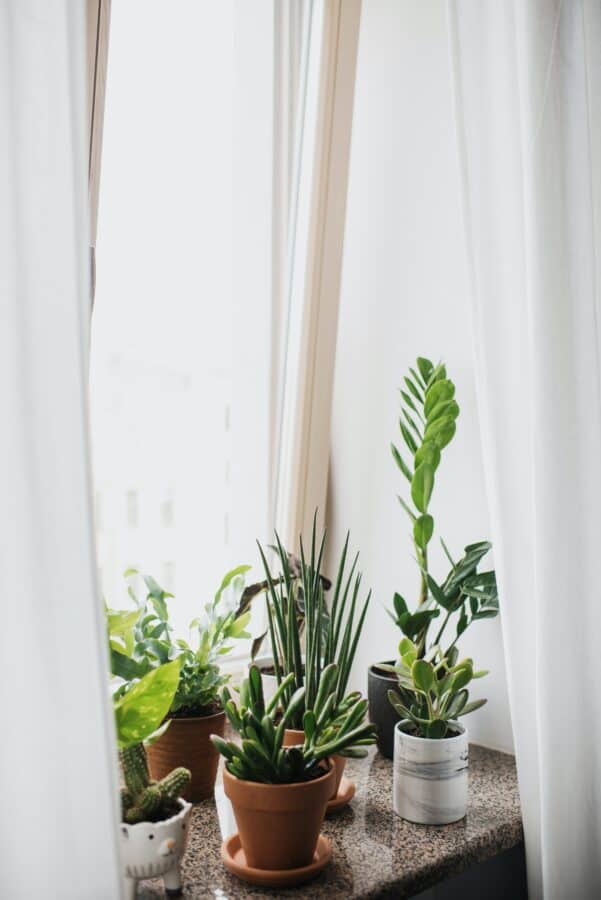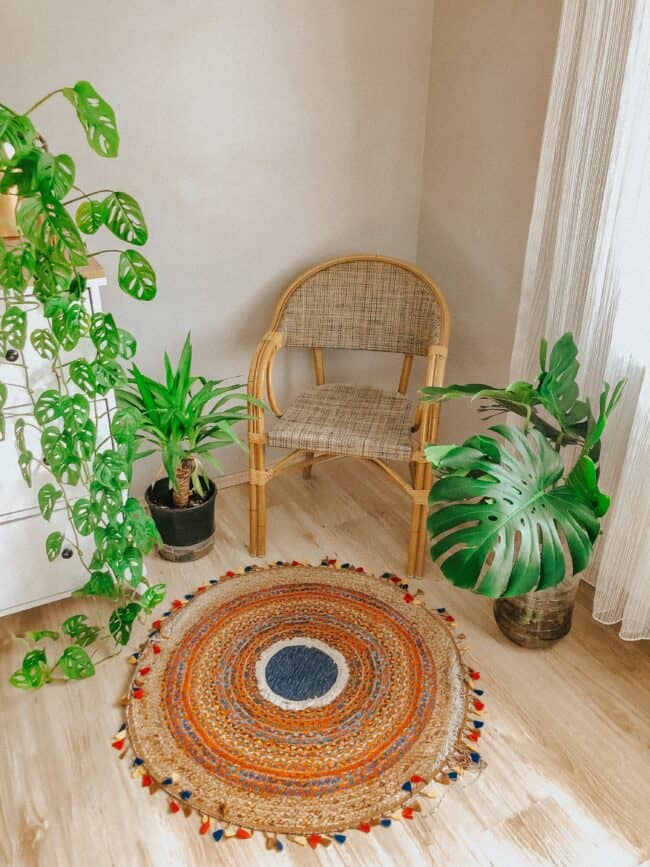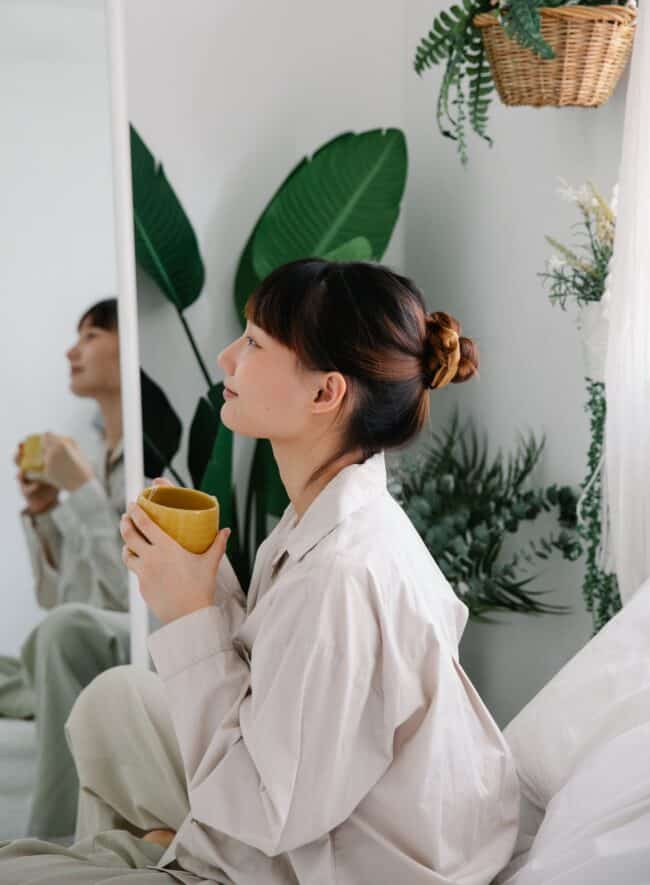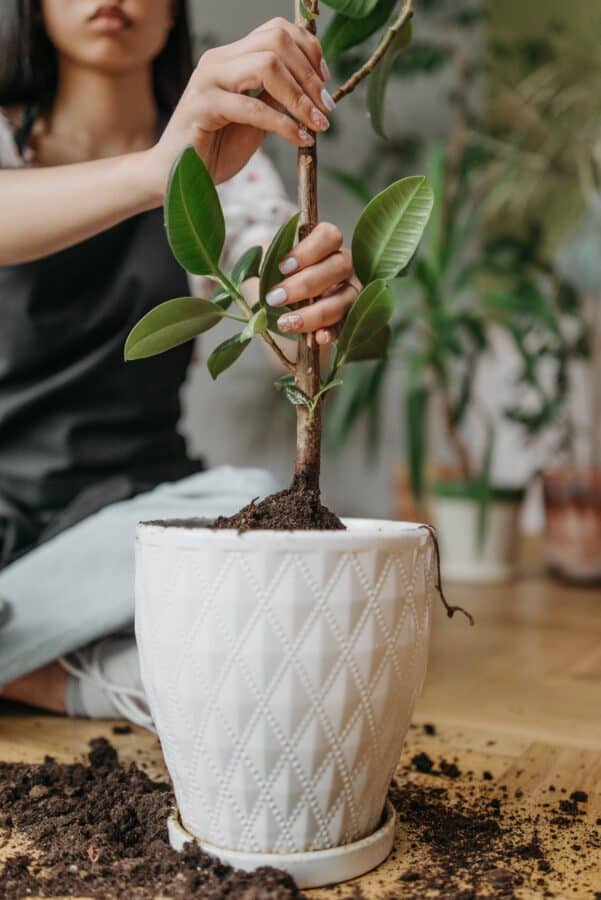Why House Plants can Help Your Wellbeing
Bring the outdoors inside by scattering house plants throughout your home! House plants can greatly enhance your wellbeing and mental health. Find out why here!
We are all constantly being told that being outdoors and out in nature is good for us and our mental health.
But you can actually bring that indoors too, by scattering house plants throughout your home!
Studies have shown that people who care for house plants in their homes experience less stress, their blood pressure is lower, and they have better mental health.
So read on for all the reasons you need to have house plants in your home!
Plants are Natural Air Purifiers
House plants can help purify the air by absorbing toxins and releasing oxygen. They can remove pollutants such as formaldehyde, benzene, and ammonia, making the air cleaner and healthier to breathe.
The air inside our homes can be pretty unhealthy, especially considering factors such as VOCs that are released from furnishings, dust and more.
So by scattering house plants throughout your home you are helping make your indoor air so much better.
Plants Regulate the Humidity in your Home
Plants release moisture through a process called transpiration. This can increase humidity levels in your home, which can be particularly beneficial in dry indoor environments, helping to prevent issues such as dry skin and respiratory problems.
House Plants Look Good in Your Home!
Plants can enhance the visual appeal of your home. They add color, texture, and a natural element to your decor, making your living space more inviting and beautiful.
How House Plants Help Your Wellbeing
Studies have shown that the presence of house plants can reduce stress and anxiety. Caring for plants can be therapeutic, and their green foliage can have a calming effect.
House plants can contribute to a sense of well-being and happiness. They provide a connection to nature, which can have a positive impact on mental health.
Certain plants, such as lavender and jasmine, emit fragrances that can promote better sleep and relaxation when placed in the bedroom.
Plants can also help absorb and muffle sound, making your home quieter and more peaceful.
Many people believe that plants radiate positive energy and create a harmonious atmosphere in the home too!
The Easiest House Plants to Care For
You don’t have to have the greenest of thumbs to take care of house plants in your home. But some plants are definitely easier than others to care for.
If you are new to caring for house plants or you have a busy schedule, it’s a good idea to start with easy-to-care-for plants that require minimal maintenance.
Here are some of the easiest house plants to care for:
- Snake Plant (Sansevieria): Snake plants are incredibly hardy and can tolerate low light and irregular watering. They’re known for their air-purifying properties and can thrive in various conditions.
- Pothos (Epipremnum aureum): Pothos is a popular choice for beginners. They can adapt to low light but also do well in indirect sunlight. Pothos plants are forgiving when it comes to watering and can thrive in a range of conditions.
- Spider Plant (Chlorophytum comosum): Spider plants are known for their air-purifying abilities and are relatively easy to care for. They prefer bright, indirect light and should be watered when the soil becomes dry.
- ZZ Plant (Zamioculcas zamiifolia): ZZ plants are incredibly resilient and can tolerate low light and infrequent watering. They’re an excellent choice for those who tend to forget about their plants.
- Peace Lily (Spathiphyllum): Peace lilies are known for their elegant white flowers and air-purifying qualities. They thrive in low to moderate light and prefer to be kept evenly moist but can tolerate occasional drying out.
- Aloe Vera: Aloe vera is a succulent that’s easy to care for. It prefers bright, indirect light and should be allowed to dry out between waterings. It’s also useful for soothing minor burns and skin irritations.
- Rubber Plant (Ficus elastica): Rubber plants are low-maintenance and can thrive in various light conditions, from bright indirect light to low light. Allow the soil to dry out between waterings.
- Dracaena: There are several varieties of dracaena, and many of them are low-maintenance. They do well in moderate to bright indirect light and should be watered when the top inch or two of soil is dry.
- Succulents and Cacti: Succulents and cacti are known for their drought tolerance. They prefer bright light and require infrequent watering. They come in a variety of shapes and sizes.
- Chinese Evergreen (Aglaonema): Chinese evergreens are adaptable and can tolerate low to moderate light. They prefer to be kept consistently moist but can also tolerate occasional drying out.
Remember to consider your home’s specific lighting conditions and choose plants that match them.
Also, be mindful not to overwater, as many house plants suffer more from too much water than too little.
Always check the specific care requirements for the plant you choose, as they can vary slightly from species to species.
How to Get Advice on Caring for House Plants
Getting advice on caring for house plants is essential, especially if you’re new to plant care or if you have specific questions about maintaining particular plants. Here are several ways to seek advice on caring for your house plants:
- Local Nurseries and Garden Centers: Visit your local plant nurseries or garden centers. They often have knowledgeable staff who can provide advice on plant care, recommend suitable plants for your space, and address any issues or concerns you may have.
- Online Plant Communities: Join online communities and forums dedicated to plant enthusiasts. Websites like Reddit’s r/houseplants, Facebook groups, and plant-focused forums offer a wealth of information and a place to ask questions and share experiences with fellow plant lovers.
- Plant Care Apps: There are various mobile apps designed to help you care for your house plants. These apps often include plant identification, care instructions, and reminders for watering and maintenance.
- Plant Care Books: Invest in plant care books or guides. Many books are available that cover the care of specific types of house plants or offer general tips for indoor gardening. These can serve as valuable references.
- YouTube Tutorials: Search for plant care tutorials on YouTube. Many experienced plant enthusiasts and horticulturists create informative videos on plant care, propagation, and troubleshooting common issues.
- Social Media: Follow plant care experts, botanists, and horticulturalists on social media platforms like Instagram and Twitter. They often share tips, advice, and stunning photos of their plants.
- Plant Tags and Labels: Refer to the care instructions on the plant’s tag or label. These typically provide information on light requirements, watering frequency, and other care tips specific to the plant.
- Plant-Specific Websites: Some websites specialize in specific types of plants and offer detailed care guides. For example, if you have a specific plant like a monstera or a fiddle leaf fig, you can find dedicated websites with care instructions.
- Ask Friends and Family: If you have friends or family members who are experienced plant caregivers, don’t hesitate to ask them for advice or guidance. They may be able to share their knowledge and even provide cuttings or divisions of their own plants.
- Consult a Horticulturist: If you have a particularly challenging or rare plant that requires specialized care, consider consulting a local horticulturist or botanist. They can provide personalized advice based on your specific plant and environmental conditions.
When seeking advice, be sure to provide details about your specific plant, including its species or common name, current condition, and the environment in which it’s located (e.g., light levels, humidity).
The more information you provide, the more accurate and helpful the advice you receive will be.
Bring the outdoors inside by scattering house plants throughout your home! House plants can greatly enhance your wellbeing and mental health. Find out why here!




